Thomas "Stonewall" Jackson
Best known as: Confederate general
Born: January 21, 1824 in Clarksburg, Virginia
Died: May 10, 1863 at Guinea Station, Virginia
Resting place: Oak Grove Cemetery, Lexington, Virginia
Full name: Thomas Jonathan Jackson
Biography:
Thomas Jackson, one of the most iconic and amazing generals of the Civl War, was born in 1824 in Clarksburg, Virginia, which is now part of West Virginia. His parents were named Jonathan and Julia, and he had two older siblings. His father and sister died of typhoid fever in 1826. His mother gave birth to his younger sister Laura Ann shortly thereafter. The family struggled financially. They sold their house and moved into a small apartment, and Julia supported her family by teaching and sewing. In 1830, Julia remarried and had another child with her new husband, Capt. Blake Woodson. Shortly after that, she died, leaving Thomas and his siblings, Warren and Laura Ann, as orphans. Thomas and Laura Ann went to live with their uncle, Cummins Jackson, at Jackson's Mill. Four years later, Thomas was sent to live with his aunt, but his aunt's husband treated him cruelly, so he went back to Jackson's Mill. He lived there for seven more years, helping his uncle around the farm and going to school whenever he could. One of the slaves on the farm provided him with pine knots that he used as a source of light so that he cuold stay up late reading. In exchange, he taught the slave to read, something that was illegal in Virginia, and the slave eventually escaped via the Underground Railroad.
As a young adult, Thomas worked as a schoolteacher. In 1842, he was admitted to West Point. He struggled academically due to his lack of formal education, but he worked hard and ended up graduating 17th in his class of 59. Upon graduation in 1846 he was appointed a second lieutenant in the 1st U.S. Artillery Regiment. He served in the Mexican-American War from 1846-1848 and participated in various battles, including Contreras, Chapultepec, Mexico City, and the Siege of Veracruz. At the Battle of Chapultepec, he disobeyed an order to retreat, explaining that doing so would actually be more dangerous than continuing to fight against the more numerous enemy. He received a brevet promotion to the rank of first lieutenant and then major. He first met Robert E. Lee during this time.
Jackson served for short periods of time in New York and Florida after the war. In Florida, he did not get along with his commanding officer, Major William French, and the two filed numerous complaints against each other.
In 1851 Jackson became Professor of Natural and Experimental Philosophy and Instructor of Artillery at Virginia Military Institute in Lexington, Virginia. He was extremely conscientious and hardworking, but was unpopular with his students, who called him "Tom Fool." They found him to be too strict and disliked the fact that he recited his lectures from memory as opposed to explaining things in a way that they could easily understand. In addition to his duties at VMI, Jackson taught Sunday school classes for both slaves and free blacks at the local Presbyterian church. Also during this time, he met and fell in love with Elinor Junkin, the daughter of the president of nearby Washington College. They married in 1853. Tragically, Elinor died in childbirth in 1854, and their baby also died.
A few years later, a new lady entered Jackson's life: Mary Anna Morrison, whose father was the president of Davidson College in North Carolina. They married in 1857. Their first daughter was born in 1858, but she died at less than a month old. Thomas and Mary purchased a house in Lexington in 1859. Later that year, Jackson and dozens of VMI cadets reported to Charles Town, Virginia to provide additional security at the hanging of abolitionist John Brown.
When the Civil War broke out in 1861, Jackson made the choice to stay loyal to his state of Virginia and joined the Confederate armed forces. Given the rank of colonel, he initially served as a drill master, a role for which his strict and disciplined nature made him well-suited. He was put in charge of a brigade consisting of four regiments of Virginia infantry from the Shenandoah Valley region. On May 23, Jackson led a successful raid on the B&O Railroad, which was used by Union troops as a supply route. Cleverly, he asked railroad officials to limit trains to the hours of 11:00 a.m. to 1:00 p.m. so that they would not disturb his soldiers' rest. This caused traffic to back up, enabling Jackson and his troops to capture over 56 trains and locomotives. On June 17 of that year, he was promoted to brigadier general.
The Battle of Bull Run on July 21, 1861 made Jackson an icon and a hero. Union troops had begun to overpower the Confederate lines, but Jackson and his men held their ground and came to the rescue of South Carolina troops led by General Barnard Bee. To inspire his troops, Bee cried out, "There is Jackson standing like a stone wall! Rally behind the Virginians!" Although Jackson received a small wound to his finger, he and his fellow rebels successfully repelled the Union assault. In addition to glory and an enduring nickname, Jackson's performance in this battle earned him a promotion to major general.
The next spring, Jackson participated in the Peninsula Campaign, during which the Army of the Potomac, led by General George McClellan, tried to advance towards Richmond, Virginia, the capital of the Confederacy. His job was to keep the Union forces occupied and hinder their progress. Jackson suffered a small defeat at the Battle of Kernstown, but he fought so fiercely that the Union army thought he had a larger force than he did and split their forces between defending against him in the Shenandoah Valley and heading on toward Richmond. Although outnumbered 17,000 to 60,000, Jackson's troops defeated various Union generals in a series of battles, including the Battle of McDowell, Battle of Front Royal, Battle of Winchester, Battle of Cross Keys, and Battle of Port Republic. As a result, Union forces withdrew from the Shenandoah Valley. Throughout the campaign, Jackson demonstrated his tactical brilliance, boldness, and ability to inspire his troops. His forces were able to move about so quickly, confusing Union generals in the process, that they became known as "foot cavalry."
In June 1862, Jackson joined up with General Lee's Army of Northern Virginia to defend Richmond. Lee and Jackson made a great partnership because Lee was able to give general instructions and leave Jackson to figure out the details, something that few of Lee's other subordinates had the ability to do. During the Battle of Mechanicsville, Jackson and his troops made a secret train trip and surprised McClellan by appearing in front of his army. McClellan again overestimated the number of Confederate soldiers and retreated away from Richmond. Jackson next participated in a series of engagements known as the Seven Days Battles, which are not considered his best work. His troops showed up late and demonstrated a lack of coordination during these battles. Their poor performance could be explained by exhaustion from all of the marching and the train trip.
In August, Jackson participated in the Second Battle of Bull Run. He came up with the idea of a flanking maneuver that enabled he and Lee to surround General John Pope's Union forces. He was also able to capture the Union army's supplies at Manassas Junction. Then Jackson's forces took a defensive position and Pope's forces unsuccessfully attacked them. The Union troops were again forced to retreat.
In September, Jackson participated in Lee's attempt to invade Maryland. Both sides suffered heavy casualties in the Battle of Antietam on September 17, 1862. Although Jackson's troops performed admirably and held their ground, the battle was not a success for the Confederacy overall, and Lee opted to withdraw his army back to Virginia. Jackson was promoted to lieutenant general in October, and his troops were designated the Second Corps of the Army of Northern Virginia. On a personal note, Jackson's daughter Julia was born on November 23. In December, Jackson and his troops performed admirably in the Battle of Fredericksburg, during which they repelled a Union assault on the right flank of the Confederate line. This battle turned out to be a major Confederate victory.
Jackson's last battle, and perhaps his greatest victory, was the Battle of Chancellorsville, which took place from April 30 to May 6, 1863. Lee divided his forces, sending Jackson to flank the Union army while he stayed behind. Jackson's Second Corps silently marched to within a few hundred feet of the Union soldiers before suddenly charging ahead with a rebel yell. Taken completely by surprise, the Union soldiers retreated in a panic.
Tragically, as Jackson and his staff returned to camp on May 2, Confederate soldiers from the 18th North Carolina infantry regiment fired at them, mistaking them for the enemy. Jackson was hit by three bullets, and several staff members and horses were killed. Jackson was placed on a stretcher but was dropped several times In the darkness and confusion. His left arm was amputated when he got back to camp, and he was taken to a nearby plantation to recover. His wife Mary and daughter Julia visited him. Over the next few days, he began to feel a little better. However, weakened by his wounds, he had caught pneumonia. He remained brave and true to his faith until the end, remarking shortly before he passed away that he was glad he would die on a Sunday. Stonewall Jackson died on May 10, 1863. His death was a huge loss for the Confederacy both strategically and spiritually. Lee famously remarked, "He has lost his left arm but I my right."
Physical characteristics:
Jackson had curly dark hair and bright, intense blue eyes. He did not care much about what he looked like, and his attire of choice was an old, battered gray uniform.
Personality:
Jackson was quirky, eccentric, and socially awkward. His demeanor was serious and strict. He could be difficult to get along with, but his troops and the Confederate people as a whole found him inspirational. He was hardworking, disciplined, and meticulous in both his academic career and in military matters. He was undoubtedly gifted as a military leader, but religion was his greatest passion in life. Theology was his favorite subject to discuss, and his faith in God contributed to his courage in battle.
Fun facts:
- Loved fruits, especially peaches and lemons.
- Believed that one of his arms was longer than the other and often held up his longer arm to balance out his circulation.
- Believed that it was healthy to remain standing as much of the time as possible, because it kept one's organs in place.
- Jeb Stuart bought him a fancy new uniform at one point, which his staff made him wear to dinner. Everyone was shocked to see him in such nice clothes, and he was so embarrassed at the attention that he never wore it again.
- His favorite horse was Little Sorrel, a small chestnut gelding.
- Was featured on the Confederate $500 bill in 1864.
Quotes:
- "My religious belief teaches me to feel as safe in battle as in bed. God has fixed the time for my death. I do not concern myself about that, but to be always ready, no matter when it may overtake me. That is the way all men should live, and then all would be equally brave."
- "To move swiftly, strike vigorously, and secure all the fruits of victory, is the secret of successful war."
- "War means fighting. The business of the soldier is to fight. Armies are not called out to dig trenches, to live in camps, but to find the enemy and strike him; to invade his country, and do him all possible damage in the shortest possible time. This will involve great destruction of life and property while it lasts; but such a war will of necessity be of brief continuance, and so would be an economy of life and property in the end."
- "Always mystify, mislead, and surprise the enemy, if possible; and when you strike and overcome him, never let up in the pursuit so long as your men have strength to follow; for an army routed, if hotly pursued, becomes panic-stricken, and can then be destroyed by half their number. The other rule is, never fight against heavy odds, if by any possible maneuvering you can hurl your own force on only a part, and that the weakest part, of your enemy and crush it. Such tactics will win every time, and a small army may thus destroy a large one in detail, and repeated victory will make it invincible."
- "Let us cross over the river and rest under the shade of the trees" (his last words).
Pictures:
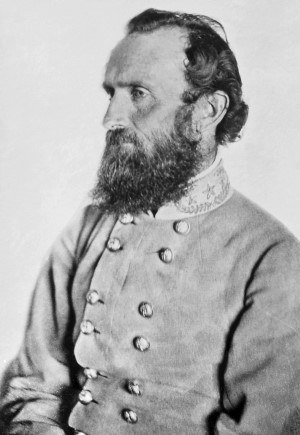
The last photo of Jackson, taken on April 26, 1863 at a farm in Spotsylvania County
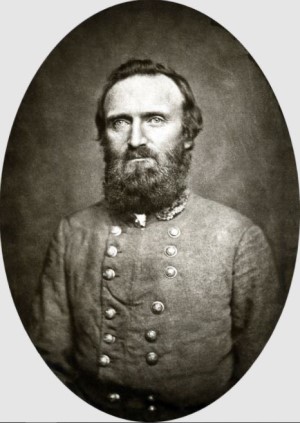
Jackson in Winchester, Virginia, November 1, 1862

Painting of Jackson by Augusto Ferrer-Dalmau via WikiMedia
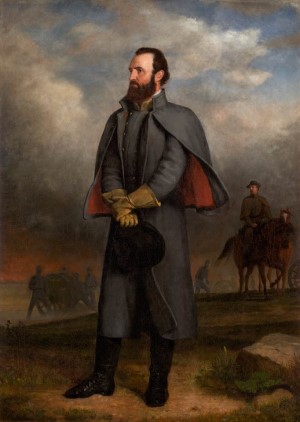
Painting of Jackson by James Reeve Stuart, 1869
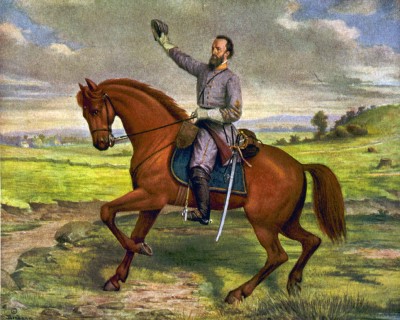
Jackson and Little Sorrel by David Bendann
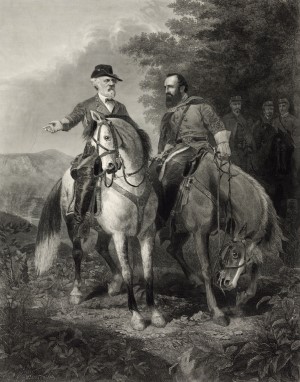
Jackson and Lee at Chancellorsville by Everett B. D. Julio, 1869

Jackson during the Mexican War
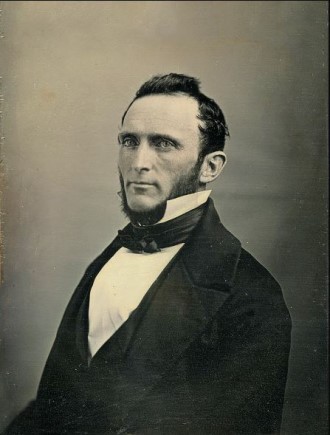
Jackson in 1855 - he had this photo taken while visiting his aunt and uncle, as a memento for them
Jackson's signature
